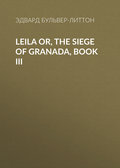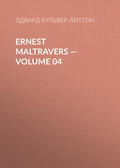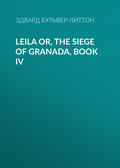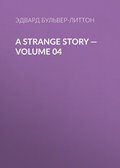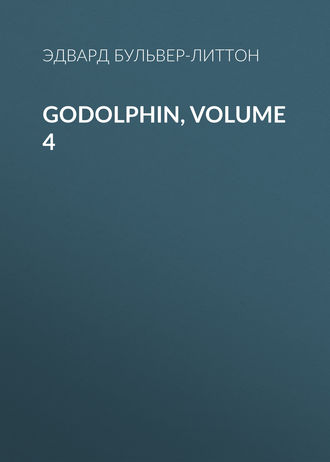
Эдвард Бульвер-Литтон
Godolphin, Volume 4
Before he regained his home, Godolphin's resolve was taken. The next day he had promised Constance to attend her to Tivoli; he resolved then to take leave of her, and on the following day to return to Lucilla. He remembered, with bitter reproach, that he had not written to her for a length of time, treble the accustomed interval between his letters; and felt that, while at the moment she had written the lines he had now pressed to his bosom, she was expecting, with unutterable fondness and anxiety, to receive his lukewarm assurances of continued love, the letter he was about to write in answer to hers was the first one that would greet her eyes. But he resolved, that in that letter, at least, she should not be disappointed. He wrote at length, and with all the outpourings of a tenderness reawakened by remorse. He informed her of his immediate return, and even forced himself to dwell upon it with kindly hypocrisy of transport. For the first time for several weeks, he felt satisfied with himself as he sealed his letter. It is doubtful whether that letter Lucilla ever received.
CHAPTER XL
TIVOLI.—THE SIREN'S CAVE.—THE CONFESSION
Along the deathly Campagna, a weary and desolate length of way,—through a mean and squalid row of houses—you thread your course; and behold—Tivoli bursts upon you!
"Look—look!" cried Constance, with enthusiasm, as she pointed to the rushing torrent that, through matted trees and cragged precipices, thundered on.
Astonished at the silence of Godolphin, whom scenery was usually so wont to kindle and inspire, she turned hastily round, and her whole tide of feeling was revulsed by the absorbed but intense dejection written on his countenance. "Why," said she, after a short pause, and affecting a playful smile, "why, how provoking is this! In general, not a common patch of green with an old tree in the centre, not a common rivulet with a willow hanging over it, escapes you. You insist upon our sharing your raptures—you dilate on the picturesque—you rise into eloquence; nay, you persuade us into your enthusiasm, or you quarrel with us for our coldness; and now, with this divinest of earthly scenes around us,—when even Lady Charlotte is excited, and Mr. Saville forgets himself, you are stricken into silence and apathy! The reason—if it be not too abstruse?"
"It is here!" said Godolphin, mournfully, and pressing his hand to his heart.
Constance turned aside; she indulged herself with the hope that he alluded to former scenes, and despaired of the future from their remembrance. She connected his melancholy with herself, and knew that, when referred to her, she could dispel it. Inspired by this idea, and exhilarated by the beauty of the morning, and the wonderful magnificence of nature, she indulged her spirits to overflowing. And as her brilliant mind lighted up every subject it touched, now glowing over description, now flashing into remark, Godolphin at one time forgot, and at another more keenly felt, the magnitude of the sacrifice he was about to make. But every one knows that feeling which, when we are unhappy, illumines (if I may so speak) our outward seeming from the fierceness of our inward despair,—that recklessness which is the intoxication of our grief.
By degrees Godolphin broke from his reserve. He seemed to catch the enthusiasm of Constance; he echoed back—he led into new and more dazzling directions—the delighted remarks of his beautiful companion. His mind, if not profoundly learned, at least irregularly rich, in the treasures of old times, called up a spirit from every object. The waterfall, the ruin, the hollow cave—the steep bank crested with the olive—the airy temple, the dark pomp of the cypress grove, and the roar of the headlong Anio,—all he touched with the magic of the past—clad with the glories of history and of legend—and decked ever and anon with the flowers of the eternal Poesy that yet walks, mourning for her children, amongst the vines and waterfalls of the ancient Tibur. And Constance, as she listened to him, entranced, until she herself unconsciously grew silent, indulged without reserve in that, the proudest luxury of love—pride in the beloved object. Never had the rare and various genius of Godolphin appeared so worthy of admiration. When his voice ceased, it seemed to Constance like a sudden blank in the creation.
Godolphin and the young countess were several paces before the little party, and they now took their way towards the Siren's Cave. The path that leads to that singular spot is humid with an eternal spray; and it is so abrupt and slippery, that in order to preserve your footing, you must cling to the bushes that vegetate around the sides of the precipice.
"Let us dispense with our guide," said Godolphin. "I know every part of the way, and I am sure you share with me in dislike to these hackneyed indicators and sign-posts for admiration. Let us leave him to Lady Charlotte and Saville, and suffer me to be your guide to the cavern." Constance readily enough assented, and they proceeded. Saville, by no means liking the difficult and perilous path which was to lead only to a very cold place, soon halted; and suggested to Lady Charlotte the propriety of doing the same. Lady Charlotte much preferred the wit of her companion's conversation to the picturesque. "Besides," as she said, "she had seen the cave before." Accordingly, they both waited for the return of the more adventurous countess and her guide.
Unconscious of the defalcation of her friends, and not—from the attention that every step required—once looking behind, Constance continued. And now, how delightful to her seemed that rugged way, as, with every moment, Godolphin's care—Godolphin's hand became necessary; and he, inspired, inflamed by her company, by her touch, by the softness of her manner, and the devotion of her attention—no, no! not yet was Lucilla forgotten!
And now they stood within the Siren's Cave. From this spot alone you can view that terrible descent of waters which rushes to earth like the coming of a god! The rocks dripped around them—the torrent dashed at their very feet. Down—down, in thunder, for ever and for ever, dashed the might of the maddening element; above, all wrath; below, all blackness;—there, the cataract; here, the abyss. Not a moment's pause to the fury, not a moment's silence to the roar;—forward to the last glimpse of the sun—the curse of labour, and the soul of unutterable strength, shall be upon those waters! The demon, tormented to an eternity, filling his dread dwelling-place with the unresting and unearthly voice of his rage and despair, is the only type meet for the spirit of the cataract.
And there—amidst this awful and tremendous eternity of strife and power—stood two beings whose momentary existence was filled with the master-passion of humanity. And that passion was yet audible there: the nature without coal; I not subdue that within. Even amidst the icy showers of spray that fell around, and would have frozen the veins of others, Godolphin felt the burning at his heart. Constance was indeed utterly lost in a whirl and chaos of awe and admiration, which deprived her of all words. But it was the nature of her wayward lover to be aroused only to the thorough knowledge of his powers and passions among the more unfrequent and fierce excitements of life. A wild emotion now urged him on; something of that turbulent exaggeration of mind which gave rise to a memorable and disputed saying—"If thou stoodest on a precipice with thy mistress, hast thou ever felt the desire to plunge with her into the abyss?—If so—thou hast loved!" No doubt the sentiment is exaggerated, but there are times when love is exaggerated too. And now Constance, without knowing it, had clung closer and closer to Godolphin. His hand at first—now his arm—supported her; and at length, by an irresistible and maddening impulse, he clasped her to his breast, and whispered in a voice which was heard by her even amidst the thunder of the giant waters, "Here, here, my early—my only love, I feel, in spite of myself, that I never utterly, fully, adored you until now!"
CHAPTER XLI
LUCILLA.—THE SOLITUDE.—THE SPELL.—THE DREAM AND THE RESOLVE
While the above events, so fatal to Lucilla, were in progress at Rome, she was holding an unquiet commune with her own passionate and restless heart, by the borders of the lake, whose silver quiet mocked the mind it had, in happier moments, reflected. She had now dragged on the weary load of time throughout the winter; and the early and soft spring was already abroad—smoothing the face of the waters, and calling life into the boughs. Hitherto this time of the year had possessed a mysterious and earnest attraction for Lucilla—now all its voices were mute. The letters that Godolphin had written to her were so few, and so restrained, in comparison with those which she had received in the former periods of absence, that—ever alive as she was to impulse, and unregulated by settled principles of hope—her only relief to a tearful and spiritless dejection was in paroxysms of doubt, jealousy, and despair.
It is the most common thing in the world, that, when we have once wronged a person, we go on in the wrong, from a certain soreness with which conscience links the associations of the injured party. And thus, Godolphin, struggling with the return to his early and never-forgotten love, felt an unwillingness that he could seldom successfully combat, in playing the hypocrite to Lucilla. His very remorse made him unkind; the feeling that he ought to write often, made him write seldom: and conscious that he ought to return her expressions of eager devotion, he returned them with involuntary awkwardness and reserve. All this is very natural, and very evident to us; but a thousand mysteries were more acceptable to, more sought for and more clung to, by Lucilla, than a conjecture at the truth.
Meanwhile she fed more and more eagerly on those vain researches which yet beguiled her time, and flattered her imagination. In a science so false, and so unprofitable, it mattered, happily, little, whether or not the poor disciple laboured with success; but I need scarcely tell to any who have had the curiosity to look over the entangled schemes and quaint figures of the art, how slender was the advancement of the daughter in the learning of the sire. Still it was a comfort and a soothing, even to look upon the placid heaven, and form a conjecture as to the language of its stars. And, above all, while she questioned the future, she thought only of her lover. But day after day passed—no letter, or worse than none; and at length Lucilla became utterly impatient of all rest: a nervous fever possessed her; the extreme solitude of the place filled her with that ineffable sensation of irritability which sometimes preludes the madness that has been produced in criminals by solitary confinement.
On the day that she wrote that letter to Godolphin which I have transcribed, this painful tension of the nerves was more than hitherto acute. She longed to fly somewhere; nay, once or twice, she remembered that Rome was easily gained, that she might be there as expeditiously as her letter. Although in that letter only we have signified that Lucilla had expressed her wish for Godolphin's return; yet, in all her later letters, she had (perhaps, more timidly) urged that desire. But they had not taken the same hold on Godolphin; nor, while he was playing with his danger, had they produced the same energetic resolution. Lucilla could not, however, hope with much reason that the success of her present letter would be greater than that of her former ones; and, at all events, she did not anticipate an immediate compliance with her prayers. She looked forward to some excuses, and to some delay. We cannot, therefore, wonder that she felt a growing desire to follow her own epistle to Rome; and although she had been prevented before, and still drew back from absolutely favoring and enforcing the idea, by the fear of Godolphin's displeasure; yet she trusted enough to his gentleness of character to feel sure that the displeasure could scarcely be lasting. Still the step was bold, and Lucilla loved devotedly enough to be timid; and besides, her inexperience made her look upon the journey as a far more formidable expedition than it really was.
Debating the notion in her mind, she sought her usual retreat, and turned listlessly over the books which she had so lately loved to study. At length, in moving one she had not looked into before, a paper fell to the ground; she picked it up; it was the paper containing that figure, which it will be remembered, the astrologer had shown to his daughter, as a charm to produce dreams prophetic of any circumstance or person concerning whom the believer might be anxious to learn aught. As she saw the image, which, the reader will recollect, was of a remarkable design, the whole of her conversation with Volktman on the subject rushed into her mind, and she resolved that very night to prove the efficacy of the charm on which he had so confidently insisted. Fraught with the chimerical delusion, she now longed for the hours to pass, and the night to come. She looked again and again at the singular image and the portentous figures wrought upon the charm; the very strangeness of the characters inspired her, as was natural, with a belief of their efficacy; and she felt a thrill, an awe, creep over her blood, as the shadows of eve, deepening over the far mountains, brought on the time of trial. At length it was night, and Lucilla sought her chamber.
The hour was exceedingly serene, and the stars shone through the casement with a lustre that to her seemed ominous. With bare feet, and only in her night-robe, she stole tremblingly across the threshold. She paused for a moment at the window, and looked out on the deep and quiet night; and as she so stood, it was a picture that, had I been a painter, I would have devoted a youth to accomplish. Half in light—half in shadow—her undress gave the outline, and somewhat more, of a throat and breast, whose roundness, shape, and hue, never were surpassed. Her arms were lightly crossed above her bosom; and her long rich hair seeming darker by that light, fell profusely, yet not dishevelled, around her neck; parting from her brow. Her attitude at that moment was quite still, as if in worship, and perhaps it was; her face was inclined slightly upward, looking to the heavens and towards Rome. But that face—there was the picture! It was so young, so infantine, so modest; and yet, the youth and the timidity were elevated and refined by the earnest doubt, the preternatural terror, the unearthly hope, which dwelt upon her forehead—her parted lip, and her wistful and kindled eye. There was a sublimity in her loneliness and her years, and in the fond and vain superstition, which was but a spirit called from the deeps of an unfathomable and mighty love. And afar was heard the breaking of the lake in upon the shore—no other sound! And now, among the unwaving pines, there was a silver shimmer as the moon rose into her empire, and deepened at once, along the universal scene, the loveliness and the awe.
Lucilla turned from the window, and kneeling down wrote with a trembling hand upon the figure one word—the name of Godolphin. She then placed it under her pillow, and the spell was concluded. The astrologer had told her of the necessary co-operation which the mind must afford to the charm; but it will easily be believed that Lucilla required no injunction to let her imagination dwell upon the vision she expected to invoke. And it would have been almost strange, if, so intently and earnestly brooding, as she had done over the image of Godolphin, that image had not, without recurring to any cabalistical spells, been present to her dreams.
She thought that it was broad noonday, and that she was sitting alone in the house she then inhabited, and weeping bitterly. Of a sudden the voice of Godolphin called to her; she ran eagerly forth, but no sooner had she passed the threshold, than the scene so familiar to her vanished, and she was alone in an immense and pathless wilderness; there was no tree and no water in this desert; all was arid, solitary, and inanimate. But what seemed most strange to her was that in the heavens, although they were clear and bright, there was neither sun nor stars; the light seemed settled and stagnant—there was in it no life.
And she thought that she continued to move involuntarily along the waste; and that, ever and anon, she yearned and strove to rest, but her limbs did not obey her will, and a power she could not control urged her onward.
And now there was no longer an utter dumbness and death over the scene. Forth from the sands, as from the bowels of the reluctant earth, there crept, one by one, loathly and reptile shapes; obscene sounds rang in her ears—now in a hideous mockery, now in a yet more sickening solicitation. Shapes of terror thickened and crowded round her. She was roused by dread into action; she hurried faster and faster; she strove to escape; and ever as she fled, the sounds grew louder, and the persecuting shapes more ghastly,—abominations which her pure mind shuddered to behold, presented themselves at every turn: there was no spot for refuge, no cave for concealment. Wearied and despairing, she stopped short; but then the shapes and sounds seemed gradually to lose their terror; her eye and ear became familiar to them; and what at first seemed foes, grew into companions.
And now, again, the wilderness was gone; she stood in a strange spot, and opposite, and gazing upon her with intent and mournful eyes, stood Godolphin. But he seemed much older than he was, and the traces of care were ploughed deeply on his countenance; and above them both hung a motionless and livid cloud; and from the cloud a gigantic hand was stretched forth, pointing with a shadowy and unmoving finger towards a quarter of the earth which was enveloped in a thick gloom. While she sought with straining eyes, to penetrate the darkness of the spot thus fearfully marked out, she thought Godolphin vanished, and all was suddenly and utter night—night, but not stillness—for there was a roar as of many winds, and a dashing of angry waters, that seemed close beneath; and she heard the trees groan and bend, and felt the icy and rushing air: the tempests were abroad. But amidst the mingling of the mighty sounds, she heard distinctly the ringing of a horse's hoofs; and presently a wild cry, in which she recognised the voice of Godolphin, rang forth, adding to the wrath of nature the yet more appalling witness of a human despair. The cry was followed by the louder dashing of the waves, and the fiercer turmoil of the winds; and then her anguish and horror freeing her from the Prison of Sleep, she woke.
It was nearly day, but the serenity of the late night had gone; the rain fell in torrents, and the house shook beneath the fury of a violent storm. This change in the mood of nature had probably influenced the latter part of her dream. But Lucilla thought of no natural solution to the dreadful vision she had undergone. Her superstition was confirmed and ratified by the intense impression wrought upon her mind by the dream. A thousand unutterable fears, fears for Godolphin, rather than herself—or if for herself, only in connection with him—bore irresistible despotism over her thoughts. She could not endure to wait, to linger any longer in the dark and agitated suspense she herself had created; the idea she before had nursed now became resolve, she determined forthwith to set out for Rome—to see Godolphin. She rose, woke her attendant, and that very day she put her resolution into effect.




